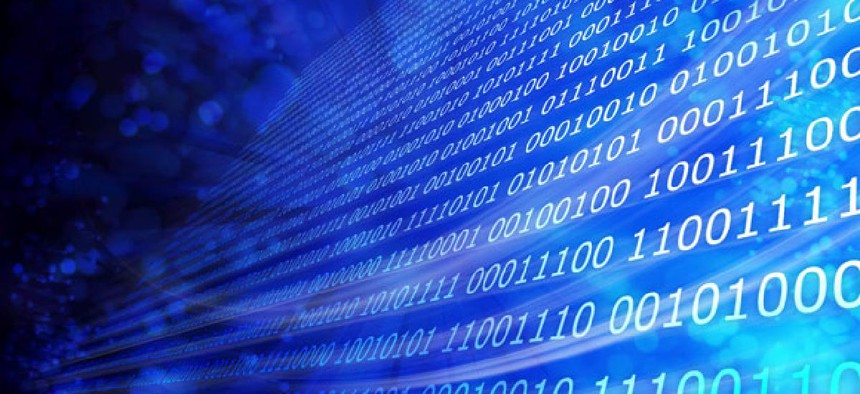Analysis: Government’s Vast Lockers of Data Threaten Basic Individual Freedoms

seewhatmitchsee/Shutterstock.com
Freedom is a joke when a life's history resides forever in a vast database.
I’m going to try to tie together strands of information NSA-style and see if a pattern emerges. I will be looking for signs that America’s historic definition and understanding of privacy are being eroded. I will also try to understand if that erosion could fundamentally alter an individual American’s relationship to government power.
Privacy is not the only definition of individual freedom. But freedom cannot exist in a world where search and seizure without suspicion or probable cause does. Freedom is merely a word, and its definition a putrid joke in a world where a life’s history—encoded in DNA alleles or via Internet or telephone communications—resides forever in a vast government database.
Last week visited upon the country the latest, but by no means the first, examples of ever-expanding government powers to collect data on innocents and keep it for extended periods of time and on the government’s terms. One example was surveillance. The other was in obtaining DNA swabs from arrestees. The first example raised considerable alarms. The second did not. Make no mistake, both are a threat to individual freedom, and both will feed the coming Storage Wars. Those wars will be fought over definitional American legal terrain—what that is uniquely yours belongs to you, and what belongs to the government for how long and why.
We learned last week about vast telephone tracking conducted by the National Security Agency. Then came revelations about PRISM, a massive Internet data-trolling system so successful in terms of intelligence aggregation that its handiwork routinely shows up in President Obama’s daily briefing.
The revelations generated global headlines and immediately revived a privacy-versus-government-power debate in hibernation since the first USA Patriot Act reauthorization battles in 2005 and 2006. But they shouldn’t have. More precisely, the revelations should not have surprised us. Consider the following paragraph, published in Wired magazine in March 2012, about a vast NSA data-collection center under construction in Bluffdale, Utah.
“In the process—and for the first time since Watergate and the other scandals of the Nixon administration—the NSA has turned its surveillance apparatus on the U.S. and its citizens. It has established listening posts throughout the nation to collect and sift through billions of e-mail messages and phone calls, whether they originate within the country or overseas. It has created a supercomputer of almost unimaginable speed to look for patterns and unscramble codes.”
The NSA facility will store a mind-boggling amount of information. Some estimates say the facility, due for completion in September, could hold a yoyobyte of data. It is beyond my ken to explain how big a yoyobyte is, but Forbes takes a pretty good crack at it. What all of us can do is wonder, and do so without a whiff of paranoia, about the frightening implications of a government-monitored, government-secured, and highly secret trove of personal data held in perpetuity in the name of public safety.
Those concerns grow when, as Sen. Ron Wyden, D-Ore., alleges, those who sit atop the NSA data-collection system mislead Congress about the sweeping scope of its surveillance. When Wyden asked Director of National Intelligence James Clapper if the NSA collected “any data at all on millions or hundreds of millions of Americans,” Clapper said no. We’ve learned that was a lie. Clapper recently defended the answer as the “least untruthful” he could give. Reassurances about congressional oversight—which issue forth from the White House with metronomic monotony—are meaningless when direct questions are met with dishonest answers.
Does the surveillance work in stopping terrorist attacks? Yes, if you believe government explanations of the Najibullah Zazi bust. But even that story has holes.
The larger question is this: Can efficacy justify a gradual dismantling of liberty? Can it, and should it, erode or erase basic human aspiration, central to revolution and the Constitution, to own one’s humanity without government search, seizure, or perpetual data collection and storage? A government that promises near-perfect prevention of terrorism or crime will also demand near-endless compliance from you about access to all you do, say, think, write, spend, save, invest, imagine, live, and hope. It might also demand your genetic blueprint.
Which brings us to the Supreme Court decision in King v. Maryland. The 5-4 majority upheld a Maryland law that allows police to obtain a DNA swab of anyone arrested for a serious crime. The DNA swab is supposedly needed to identify the suspect. Associate Justice Antonin Scalia, who wrote the dissent, destroyed that rationale. The court's decision may not be the last word on the government's ability to forcibly extract DNA from arrestees, but the decision will doubtless protect laws in 27 states and current federal law that condones the practice.
In fact, the U.S. Solicitor General, Donald Verrilli Jr., submitted a brief defending the Maryland law, and onPage 5 made clear that federal law is even more expansive than the Maryland one under court review. You may not know this, but the federal government has the power now to obtain a DNA swab from anyone it arrests on any charge (Maryland requires it only for serious felonies). The federal government can analyze the DNA evidence before the arrestee is even arraigned (Maryland waits until that first court appearance). And if you are arrested and swabbed by the federal government and exonerated, you must ask the government to erase its DNA file on you (Maryland does it without a formal request).
There are more than 4,500 federal crimes, and being arrested--not convicted or even arraigned, just arrested--for just one puts you on the fast track to swab-city. And if you are released and forget to ask for your DNA sample to be destroyed, it goes into a vast government database. Where nothing bad can happen, right?
Ask George Shirakawa Jr., and he can tell you of a case that reads like a farce but is disturbingly true. It's about how a DNA swab implicated him in a campaign fraud case through a single licked envelope. That linkage occurred only because a DNA database existed and Shirakawa allowed himself to be swabbed for crimes unrelated to the campaign caper--a felony caper. Shirakawa is not a sympathetic figure. But that's not the point. He was implicated in a crime authorities had no evidentiary basis for suspecting him of, and they only zeroed in on him because of warehoused DNA.
Since King v. Maryland, there has been much discussion about the regulatory search powers of government versus investigative searches and how arrests can be arbitrary and disproportionately affect minorities and the poor.
My concern is entering an era of phone tracking, data mining, and DNA collection in the name of public safety that has already and will, if not stopped, destroy any recognizable definition of individual liberty, privacy, and protection from abusive government monitoring. The repository of our freedom is the National Archives. The repository of a nagging, annoying, and possibly abusive security state will soon be finished in Utah. It may also reside in DNA databases of dubious utility. We are creating monuments not to our freedoms or the fights on behalf of freedom but to our ability to store yoyobytes on us all.
The NSA revelations are only part of the story. The Supreme Court is another. It’s all “legal.” But that doesn’t mean it isn’t a threat. It’s a threat as big as a yoyobyte.
This article appears in the June 12, 2013, edition of National Journal Daily as Storage Wars.
(Image via seewhatmitchsee/Shutterstock.com)
NEXT STORY: What the NSA can't do with your data (probably)






